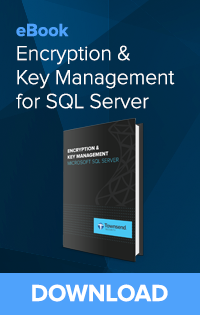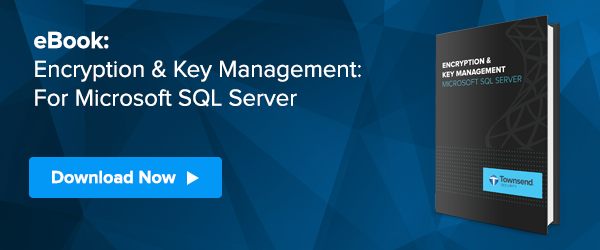How easy is securing and protecting sensitive data on SharePoint?
Over time Microsoft has been moving SQL server underneath almost all of their core enterprise products (SharePoint, CRM, Dynamics, etc.), which is great news for IT administrators because SQL Server supports automatic encryption. This means that protecting your SharePoint database and meeting compliance regulations (PCI-DSS, FFIEC, HIPAA, etc) is easier than ever.
 SQL Server Enterprise and higher editions (starting with 2008 through 2012) fully implements extensible key management (EKM) and encryption to protect data. Installing encryption on that platform is the first step--administrators can then leverage the automatic encryption capabilities of SQL Server with only a few commands and no application changes. The second step is to understand the importance of protecting your encryption keys using separation of duties and dual control on an external Hardware Security Module (HSM).
SQL Server Enterprise and higher editions (starting with 2008 through 2012) fully implements extensible key management (EKM) and encryption to protect data. Installing encryption on that platform is the first step--administrators can then leverage the automatic encryption capabilities of SQL Server with only a few commands and no application changes. The second step is to understand the importance of protecting your encryption keys using separation of duties and dual control on an external Hardware Security Module (HSM).
The path to implementing encryption and key management for SharePoint is one of the most straightforward and easy paths. Townsend Security’s Alliance Encryption Key Management solution fully supports automatic SQL Server encryption and integrates with ease.
What impact does encryption have on SharePoint performance? Should users and administrators be concerned?
Encryption will always be a CPU intensive task and there will be some performance impact due to extra processing power needed for encryption and decryption. However, the Microsoft encryption libraries as well as the .NET environment are highly optimized for performance. I have always seen very good performance on SQL Server and the native encryption capabilities that it provides. Microsoft reports that Transparent Data Encryption (TDE) on SQL Server may cost you 2-4% penalty in performance, and our own tests show similar results that fall on the 2% end of things. There are also several encryption and encryption key management solutions on the market, and each one performs a little differently.
Ultimately, performance depends on the amount of data you’re storing, and I always recommend that a customer take into account all factors that affect performance including encryption, number of users, size of documents, number of documents, and the underlying platform they’re using.
Lastly, it’s important to note that using an external HSM for key management (a critical piece of compliance), like our Alliance Key Manager, does not affect the performance profile of the database that is under protection.
In the end, if you are storing sensitive information on SharePoint, then you likely fall under industry regulations and state privacy laws. Regardless of your industry segment, whether its medical, financial, retail, education, or government bodies, you have a lot of choices to get your sensitive data data properly protected. At the end of the day, if data gets out and it’s unencrypted, you have a data breach on your hands.
To learn more about securing SharePoint with Encryption and Key Management, listen to our latest podcast here.

